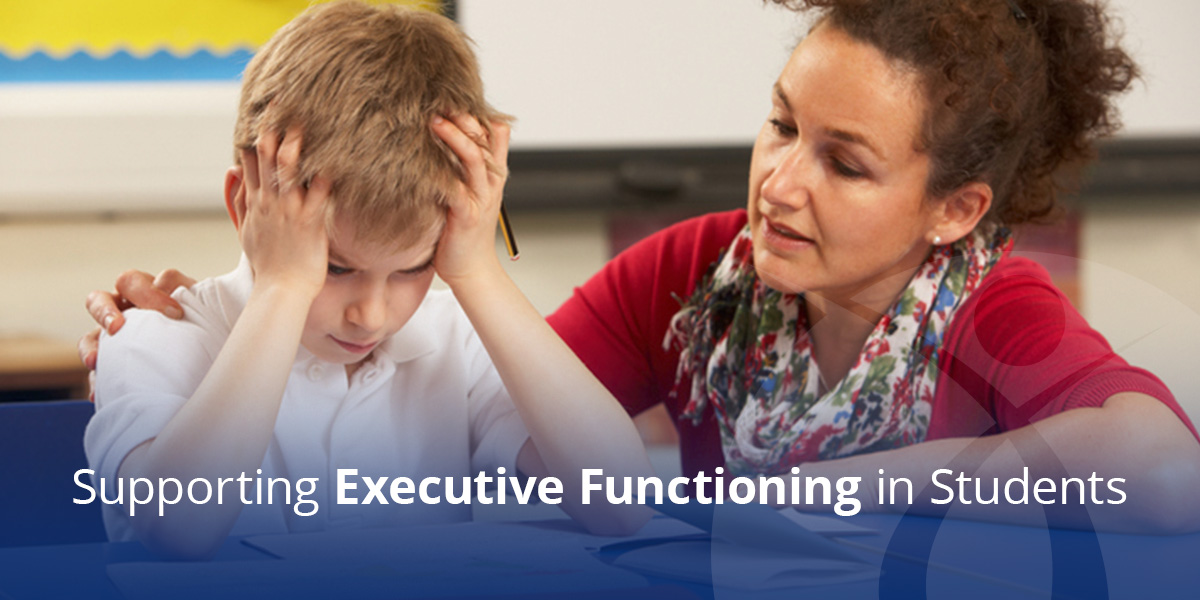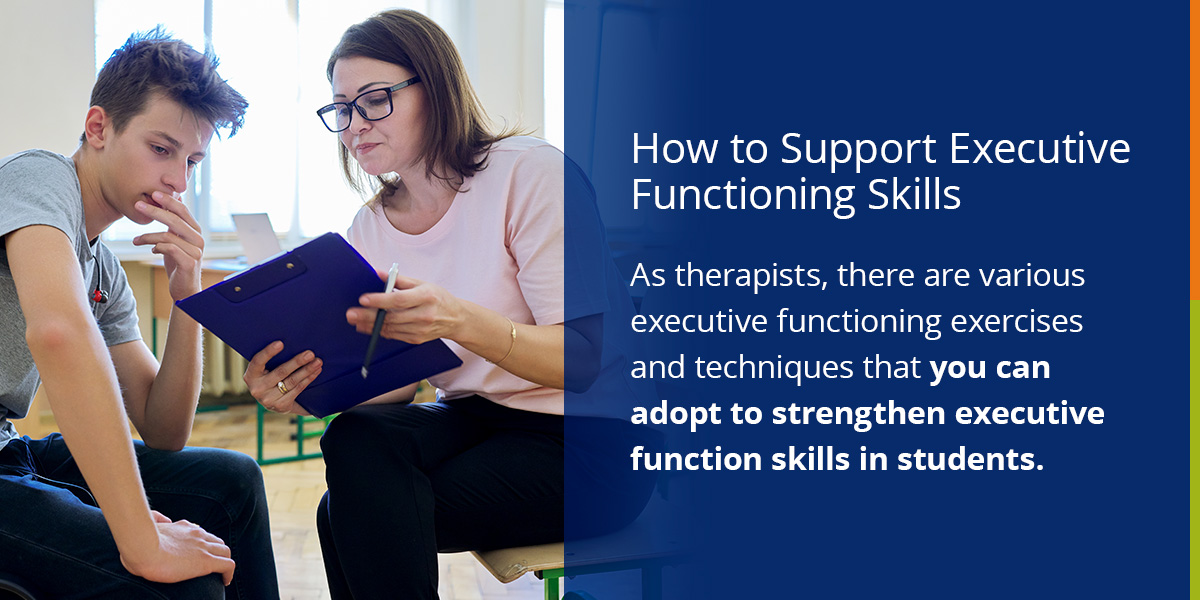
Executive functioning is an essential skill for students to develop. We aren’t born with these skills, so children need to learn them at different life stages. The most common way for children to learn executive functioning is at school, but for some students, building executive functioning skills can prove more challenging. School-based therapists can support development through strategies and learning techniques that target these thinking skills. Let’s look at the importance of executive functioning for kids and teens.
What Are Executive Functioning Skills?
Executive functioning skills refer to the ability to plan, meet goals, exercise self-control, follow multiple steps and stay focused even when distractions surround you. Below is an in-depth look at some executive functioning skills that students need for learning, along with examples:
- Planning: Ability to schedule their work for assignments.
- Organization: Using folders to organize schoolwork.
- Time management: Allowing enough time to complete homework assignments.
- Working memory: Holding newly learned information in mind to be applied later.
- Self-monitoring: Using awareness of your progress to make adjustments that are helpful
- Self-control: Inhibiting impulses to blurt out or change activities during a lesson
- Adaptive thinking: Ability to create a plan of action.
These essential thinking skills help a student prioritize their tasks, filter distractions and control their impulses. No student is born with these skills fully intact, but everyone can develop them to varying degrees. Our genes provide the blueprint for executive functioning skills, but the home and school environments help children learn and finesse these skills in the context of their daily lives.
Developing these skills is one of the fundamental tasks of early childhood and supports healthy development later in middle childhood, adolescence and adulthood. Children rely on these to help them learn how to read, write, solve arithmetic problems and participate in the classroom and group projects. It helps them to become good students, classmates and friends. On the contrary, when these skills are not developed and nurtured, kids struggle to meet expectations at school, and can grow into adults who struggle to carry out routine daily tasks and work obligations.
Executive functioning skills develop in the prefrontal cortex of the brain. They typically appear in early childhood, between 3 and 5 years old, followed by a spike in adolescence and then early adulthood. It takes a long time for people to fully develop these skills. Adult caregivers and teachers can support early development of executive functioning skills by helping children establish routines, breaking up tasks into smaller steps and playing games that encourage imagination, role-playing, following rules and self-restraint — even playing a game of peekaboo or red light-green light with young children can be an early stepping stone towards executive functioning skills.
As a child’s executive functioning improves, adults can provide opportunities for them to manage more aspects of their environment and daily life. These opportunities can build upon themselves as kids practice their thinking skills and refine their performance based on successes, challenges and feedback.
What Is a School-Based Therapist’s Role in Supporting Executive Functioning?
Therapists play a crucial role in enhancing students’ participation in daily life, particularly for students with executive function difficulties. Evaluating children’s executive functioning skills provides therapists with valuable insights into their cognitive abilities. They use their findings to tailor appropriate interventions for the student’s areas of need. With their skilled evaluation and intervention planning process, therapists are poised to help families and schools provide instruction and resources that align with students’ executive functioning strengths and weaknesses.
Early intervention is key when students show signs of struggling with executive functioning. Supporting them early can play an essential role in school success and how they navigate daily tasks and interact with others. Incorporating executive functioning strategies and activities in therapy sessions can help foster better self-awareness, problem-solving and decision-making skills. Each student is unique, and therapists are well-equipped to tailor interventions to the individual’s needs, while continually reevaluating progress to ensure optimal outcomes.
There are various tools available for therapists when assessing students’ executive functioning skills. A working memory test, for instance, can provide data on how effectively students remember information that is shown or said to them. Outside of standardized testing, naturalistic observations during classroom activities, informal student interviews, feedback from teachers and parents and a review of the student’s progress can all paint a picture of the student’s executive functioning abilities and needs.
How to Support Executive Functioning Skills
As therapists, there are various executive functioning exercises and strategies that you can implement to develop and improve students’ executive function skills. Interventions include a combination of skill-building strategies and accommodating learning styles to nurture this area of development. Below are examples of intervention strategies and techniques for therapists to use when helping students tackle schoolwork and other responsibilities requiring executive functioning abilities.

Create Checklists
The steps necessary to complete a task aren’t always obvious to kids with executive functioning weaknesses. Creating a checklist with clearly defined steps can make completing tasks less daunting. It also reduces the mental and emotional strain that children experience when they have to make decisions. It keeps them from getting wrapped up in the decision-making process or restarting a task because they think of a better way to complete it. Using a checklist helps kids focus their mental energy on the task at hand. Completing small steps along the way builds confidence and self-esteem in their abilities, providing a sense of accomplishment that fuels further efforts with challenging tasks.
Checklists can be used for nearly everything, such as the morning routine or even how to approach a math worksheet. Including tasks such as brushing teeth, making the bed, getting dressed and packing lunch can help children get ready on time and build their independence. For a math worksheet, steps might include a breakdown of what’s needed for each word problem, such as reading the problem, adding the numbers, writing the answer. Checklists can be handwritten, typed with text, drawn with simple pictures, illustrated with photos of each step or further individualized to meet the student’s communication needs.
Set Time Limits
When creating a checklist, it’s wise also to include a time limit for each task, especially if the list is for a long-term project. Breaking down the steps with time limits will help students get used to homework and assignments and learn how long these can take them to complete. For example, a checklist for a book report may include time limits for reading along with how long it should take to write the report. Time limits are especially helpful for tasks that may not have a clear ending or visible completion, such as studying vocabulary words, researching a topic or interviewing a subject. Time limits can help the student know when they are done with that step.
Use a Planner
Many schools require students to use a planner, but few teach them how to use it. Using a planner effectively may not come naturally to children who struggle with organization and planning. Kids with executive functioning challenges struggle with working memory, which means they will struggle to remember things like homework assignments. As a therapist, you can teach kids how to use a planner to write down homework and assignments, including marking off the items they need for these tasks and jotting down time limits for more open-ended assignments and studying.
Explain the Rationale
When kids learn new skills like planning and organization, explaining the rationale behind these skills is essential. If kids don’t see their value, they will think they are a waste of time. Students with cognitive deficits feel pressured by their time commitments and responsibilities, so they weigh what is worth their time and effort. Understanding the rationale behind it makes them more likely to commit to developing the skill. Better yet, showing where they are using executive functioning effectively to complete their school work can also be motivating for them to continue developing these skills.
Explore Different Learning Techniques
Learning styles naturally differ between students. Some learners may prefer graphic organizers when preparing for a written assignment. If they are learning to write essays, they may benefit from the hamburger paragraph model, in which a hamburger diagram supports writing a paragraph. Other kids learn better when movement is involved, such as counting their fingers or jumping as they skip count by 5’s. Younger children can benefit from self-talking to reduce anxiety. Another technique is Social Stories, which is an illustrated narrative about a child successfully completing a task from a child’s first-person perspective.
As children grow older, mnemonic devices can help them memorize facts.
While there are several executive functioning skills and numerous strategies to support each one, exploring one skill at a time will keep the child from becoming overwhelmed.

Take Courses From ERI and Learn More About Supporting Executive Functioning
Students must learn executive functioning skills early to succeed at school and complete daily tasks. While the most rapid development happens in the early formative years, older children are still developing and refining these skills through early adulthood. As a school-based therapist, it’s important to asses children’s executive function skills and implement interventions to bolster areas of need. You can support executive functioning development by helping students create checklists, discover their learning styles, use a planner and provide visual and auditory supports for learning.
At ERI, we are passionate about assisting therapists in developing their skills and improving care for their students. Our education courses on executive function will help you invest in your skills and improve student outcomes. Register today!
